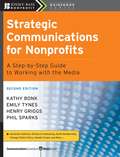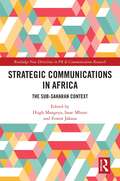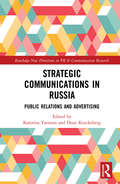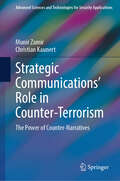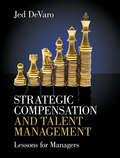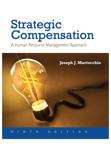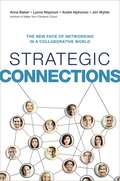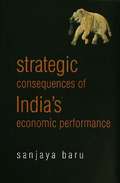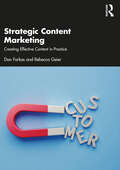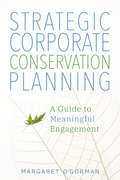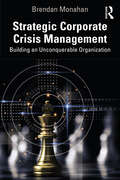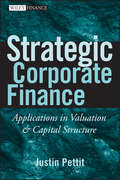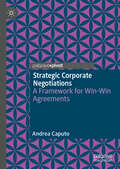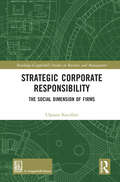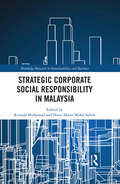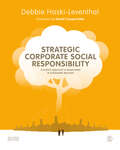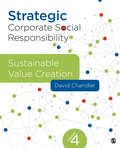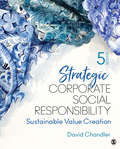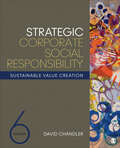- Table View
- List View
Strategic Communications for Nonprofits
by Phil Sparks Henry Griggs Kathy Bonk Emily TynesThis is a new edition of Strategic Communications for Nonprofits, which was first published in 1999. It is an up-dated, nuts-and-bolts guide to helping nonprofits design and implement successful communications strategies. The book offers a unique combination of step-by-step guidance on effective media relations and assistance in constructing and developing an overall communications strategy aimed at creating social or policy change. It first explains the basic principles of a strategic communications strategy that will define the target audiences you need to reach and tells how to develop the messages and messengers you use to reach them. The book then goes on to address specific issues like earning good media coverage, building partnerships to increase available resources, handling a crisis, and more. This second edition builds on the earlier work and includes new case studies, new trends in media and branding, ethnic media issues, and trends in technology.
Strategic Communications in Africa: The Sub-Saharan Context (Routledge New Directions in PR & Communication Research)
by Hugh MangeyaStrategic communication is a pre-requisite for the achievement of organisational goals and an effective strategic communication plan is vital for organisational success. However, systems and models dominant in the west may not necessarily be best suited for the sub-Saharan Africa reality, where many organisations lack adequate financial resources to develop and implement an effective strategic communication plan. This book examines current practices in sub-Saharan Africa, as well as the challenges faced and the intersection with culture. The Editors package inspiring debates, experiences and insights relating to strategic communication in all types of institutions, including private and public sector organisations, governmental organisations and NGOs, political parties as well as social movements in the sub-Saharan context. It explores how culture is integral to the attainment of strategic communication goals, and diverse case studies across socio-economic contexts offer insights into the successes of organisations across Africa, including Zimbabwe, South Africa, Tanzania, Lesotho, Zambia, and Nigeria. This unique edited collection is a valuable resource for worldwide scholars, researchers and students of strategic communication and organisational studies, as well as related fields including public relations, advertising, political and health communication, and international studies.
Strategic Communications in Russia: Public Relations and Advertising (Routledge New Directions in PR & Communication Research)
by Tsetsura, Katerina / Kruckeberg, DeanThis book serves as a reader exploring the scholarly inquiry, professional education, and practice of Russian public relations and advertising in multiple contexts. It examines significant parts of what can be encompassed under the umbrella of strategic communications, including public relations and advertising, rather than investigating all areas of communication in Russia. Within the context of Russia’s history, culture, and ideology, the book begins by tracing the development of communication as a field, as a discipline, and as a social institution in Russia. It then samples current studies in Russian strategic communications, examining this professional specialization’s current state and likely future directions. The book’s authors are mostly Russians who are experts in their specializations. Chapters are predicated upon the premise that this is an exciting time of great opportunity for Russian strategic communications. However, in Russia, exploiting such opportunities for strategic communications scholarship, education, and professional practice presents challenges within the context of that nation’s cultural, historical, and ideological heritage that presently may be unique. The book concludes with a prognosis of the future of Russian strategic communications. The book is recommended reading for a worldwide audience of strategic communications scholars, educators, students, and practitioners. Such readers will find the book of interest and of unique value as the book will help them to better understand, appreciate, and respect Russian strategic communications, its genesis, and present state.
Strategic Communications' Role in Counter-Terrorism: The Power of Counter-Narratives (Advanced Sciences and Technologies for Security Applications)
by Christian Kaunert Munir ZamirThis book examines the use of communications efforts in preventing and challenging extremist narratives online. These efforts are part of the expansive and well-resourced sector of preventing and countering violent extremism (P/CVE). They leverage technology tools (algorithms, direct messaging, and audience targeting) to communicate counter-extremist messaging across various digital platforms. The research and discussion focus on the role of strategic communications in deradicalizing and changing the behavioral features of ‘vulnerable’ and ‘at-risk’ audiences susceptible to extremist messaging. This approach views radicalization pathways toward violence as a key issue to tackle within online P/CVE communication efforts. This book investigates this problem and seeks to understand and assess the role, efficacy, and implications of such efforts within the broader counter-terrorism (CT) landscape, using UK counter-terrorism efforts (via the Prevent Strategy) as its primary contextual source. This analysis applies the theory of socialization, referred to in this study as ‘socialization and reasoned action strategic communication’ (SoRaSCo). The authors identify strategic communications deficiencies and offer insights for developing a roadmap for strategic communications in P/CVE in the UK and globally. Drawing on extensive research, the book provides crucial insights for policymakers, researchers, and the public interested in new trends in P/CVE, counter-terrorism, strategic communications, and policing interventions.
Strategic Compensation and Talent Management: Lessons for Managers
by Jed DeVaroWritten for current and aspiring managers, this textbook guides readers through the core components of compensation and puts them in the manager's chair, challenging them to apply their understanding to solve business problems such as attracting, managing, and retaining company talent. The book's central theme, supported by extensive treatment of compensating differentials, is that compensation is heavily driven by market competition. The coverage also includes analytics, negotiation and bargaining, wage theft, and non-profits and small businesses, as well as a detailed treatment of stock options. Case studies are included to demonstrate the principles in practice, and 'lessons for managers' in each chapter provide practical advice and takeaways. A rich package of online teaching and learning materials, including teaching slides, sample syllabi, additional case studies, and a test bank is also provided to support teachers and students.
Strategic Compensation: A Human Resource Management Approach
by Joseph MartocchioStrategic Compensation: A Human Resource Management Approach demonstrates the art and science of compensation practice and its role in a company’s competitive advantage. Through focused activities and supporting course material, readers build a solid foundation to become proficient compensation professionals. <p><p> The Ninth Edition focuses on the context of compensation practice, the criteria used to compensate employees, compensation system design issues, employee benefits, the challenges of compensating key strategic employee groups, and pay and benefits around the world, preparing readers to assume the roles of successful compensation professionals.
Strategic Complements and Substitutes
by Eric J. Van Den SteenThe framework of strategic complements and substitutes can help companies anticipate competitors' responses. It is particularly helpful in deciding on price- or capacity-commitments (or pre-emption), but it can provide more general guidance for analyzing the potential impact of commitments and pre-emption.
Strategic Connections: The New Face of Networking in a Collaborative World
by Jim Wylde André Alphonso Anne Baber Lynne WaymonToday's organizations are collaborative. With old command-and-control methods replaced by openness and transparency, networking has become an essential professional skill--expected of everyone, at every level. Unveiling eight indispensable competencies for the new Network-Oriented Workforce, Strategic Connections provides practical advice for building better, more productive business relationships. Readers will discover how to: Commit to a positive, proactive networking mindset * Align networking activities with individual and organizational objectives * Leverage their contacts by organizing them into strategic groups * Earn trust--a prerequisite for collaboration * Boost their social acumen and increase their likeability * Master conversational skills and deepen interactions * Employ storytelling to make communications memorable * Use networking to deliver value to the company Thanks to technology, new contacts are only a click away. But the level of connection and collaboration required for real success demands advanced face-to-face relationship-building skills. This book gives you the tools you need to meet goals, execute strategies, foster innovation, and make yourself invaluable to your organization.
Strategic Consequences of India's Economic Performance: Strategic Consequences Of India's Economic Performance
by Sanjaya BaruIn this book, Sanjaya Baru, one of India’s most respected commentators on political and economic issues, pays close attention to the strategic consequences of India’s increasingly impressive economic performance. The new turn in India's economic policies and performance in the last decade of the twentieth century; the success of Indian enterprise in the post-WTO world; the emergence of a confident professional middle-class; a demonstrated nuclear capability; and the resilience of an open society and an open economy, in the face of multiple and complex challenges, have all shaped India's response to the tectonic shifts in the global balance of power in the post-Cold War era. In this collection of academic essays and newspaper columns, Baru explores the business of diplomacy and the diplomacy of business in a rising India. The role of India's cultural and intellectual 'soft power' in shaping global perceptions of India are examined. The book offers a panoramic view of the geopolitics and the geo-economics of India's recent rise as a free market democracy, and as such will interest both experts and lay readers.
Strategic Considerations for First-Time Sovereign Bond Issuers
by Michael Papaioannou Magdalena Polan Udaibir S. DasA report from the International Monetary Fund.
Strategic Content Marketing: Creating Effective Content in Practice
by Dan Farkas Rebecca GeierStrategic Content Marketing offers a comprehensive guide to planning, creating, implementing and analyzing an effective content marketing strategy in practice. Each chapter marries established theory with modern practice, illustrating concepts with real-world case studies and examples alongside interviews with prominent content marketers, including a foreword by Joe Pulizzi, founder of The Content Marketing Institute and often referred to as the Father of Content Marketing. Chapter objectives and summaries structure learning, while reflective questions and activities aid comprehension. On reading, students will understand: The definition, purpose, and practical implementation of a content marketing programme The relationship between content marketing and broader marketing, strategic positioning, buyer personas, and research initiatives The most effective and valued forms of content marketing and how they are structured and used, including a special focus on digital and B2B content marketing How to create persuasive content and measure the effectiveness of content marketing The careers, associated competencies, and software technologies in the burgeoning field of content marketing. This comprehensive text is perfect core and recommended reading for advanced undergraduate and postgraduate students studying content marketing, inbound marketing, marketing communications, digital and social media marketing, and public relations. In practice, the book is also highly valuable for practicing professionals studying for professional qualifications and looking to develop their skills. Online resources include instructor teaching slides, four-color images and templates, and chapter test bank questions.
Strategic Conversations
by J. C. Spender Bruce A. StrongMost organizations fail to take full advantage of their employees' knowledge, initiative, and imagination. In this accessible and practical book, J. -C. Spender and Bruce Strong provide a guide for building entrepreneurial workforces through carefully designed conversations between management and employees. These 'strategic conversations' make employees partners in the strategy development process, engaging them to help shape the organization's future. The result is transformational: instead of strategy being a dry, periodic planning exercise for the few, it becomes a dynamic and continuous act of co-creation enriched by the many. Case studies illustrate how leading organizations have used strategic conversations to build sustained competitive advantage, create innovative business models, make better decisions under uncertainty, reduce the need for change management, and enhance employee engagement. The book will appeal to managers, entrepreneurs of all stripes, and teachers and students in schools of business and public administration.
Strategic Corporate Conservation Planning: A Guide to Meaningful Engagement
by Margaret O'GormanIndustries that drive economic growth and support our comfortable modern lifestyles have exploited natural resources to do so. But now there's growing understanding that business can benefit from a better relationship with the environment. Leading corporations have begun to leverage nature-based remediation, restoration, and enhanced lands management to meet a variety of business needs, such as increasing employee engagement and establishing key performance indicators for reporting and disclosures. Strategic Corporate Conservation Planning offers fresh insights for corporations and environmental groups looking to create mutually beneficial partnerships that use conservation action to address business challenges and realize meaningful environmental outcomes. Myriad case studies featuring programs from habitat restoration to environmental educational initiatives at companies like Bridgestone USA, General Motors, and CRH Americas are included to help spark new ideas.
Strategic Corporate Crisis Management: Building an Unconquerable Organization
by Brendan MonahanPresenting an alternative to traditional models of centralized crisis management, this book makes the case for decentralizing crisis response and building resilience where it matters most, and provides an accessible, pragmatic approach for doing so. Focusing squarely on crisis management, the book challenges the notion that corporate crisis teams can be expected to swoop in and “save the day”: the role of the crisis team should be to advance a culture of readiness across an organization, and to foster leadership and crisis competency where it’s needed, when it’s needed. Crisis management expert Brendan Monahan draws from current management and leadership thinking that challenges hierarchies, finds incredible potential in the power of an organization’s people, and aligns with many of today’s highest-performing organizations that have already adopted this approach. This may run counter to current crisis management texts prescribing highly disciplined planning and command structures, but following this book’s alternative approach will unlock tremendous potential, deepen resilience, and improve outcomes in crisis response. Professionals in crisis management, business continuity, emergency management, risk management, and others with crisis management accountability will value this practical book for “corporate crisis first responders” to use when they encounter the extraordinary.
Strategic Corporate Finance
by Justin PettitEssential guidance for the corporate finance professional -- advisor, Board Director, CFO, Treasurer, business development executive, or M&A expert--to ask the right questions and make the critical decisions. Strategic Corporate Finance is a practical guide to the key issues, their context, and their solutions. From performance measurement and capital planning to risk management and capital structure, Strategic Corporate Finance, translates principles of corporate finance theory into practical methods for implementing them. Filled with in-depth insights, expert advice, and detailed case studies, Strategic Corporate Finance will prepare you for the issues involved in raising, allocating and managing capital, and its associated risks.Justin Pettit (New York, NY) draws on his 15 years of senior advisory experience as an investment banker and management consultant. He advises corporate boards and executives on matters of capital structure, financial policy, valuation, and strategy. He also lectures on topics in advanced corporate finance to graduate and undergraduate students at universities in the New York area.
Strategic Corporate Negotiations: A Framework for Win-Win Agreements
by Andrea CaputoExploring the concept of win-win agreements, this book analyses how they pose an important challenge for entrepreneurs, managers and advisors involved in complex negotiations among firms. Providing an overview and discussion of existing literature, the author further develops a theoretical framework for analysing corporate negotiations, and illustrates how this can be implemented in real-life situations. This book presents an empirical case study from the automotive industry and analyses the negotiation between Fiat Chrysler in 2009, offering practical strategies for those involved in corporate negotiations. Presenting how win-win agreements can improve competitive advantage, this book will be an invaluable read for practitioners and scholars alike.
Strategic Corporate Responsibility: The Social Dimension of Firms (Routledge-Giappichelli Studies in Business and Management)
by Ulpiana KocollariIn her book, Dr Ulpiana Kocollari presents a unique contribution to the debate on Corporate Social Responsibility and Sustainability by clearly expressing how the configuration of a firm’s social dimension can help identify inclusive corporate governance models, define innovative management processes and reshape performance measurement systems for the evaluation and assessment of sustainable economic, social and environmental results. Moving a step further, a firm’s social dimension is defined within the configuration of stakeholders – resources – rewards patterns intrinsic to their interactions with their environment and embedded in their business activities. Based on this approach, a framework is provided to guide firms in identifying management activities grounded in and suited to their prevalent patterns, in order to support current and future strategies and establish adequate measurement and communication tools for pursuing their mission. The book contains original theoretical and empirical material and particular attention is paid to the principal social and environmental impact measurement models (i.e. Global Reporting Initiative, Social Return on Investments, Social Balanced Scorecard, etc.), analysing their main features in order to pinpoint their adequacy in assessing the social dimension and to tailor their use more closely to the specific patterns to which they refer. Finally, a detailed application of the analysis framework, which the author has identified is proposed for Innovative Start-Ups with a Social Goal and for Benefit Corporations, in order to detect the patterns embedded in their social dimension and their distinctive traits, which influence their management and measurement processes.
Strategic Corporate Social Responsibility in Malaysia (Routledge Research in Sustainability and Business)
by Rusnah Muhamad Noor Akma Mohd SallehTo fully comprehend corporate social responsibility (CSR), corporations must understand the many-sided nature of CSR. This book provides insight into the theoretical foundation, beliefs, and expectations of the multiple stakeholders; the governance of CSR commitment; and corporations’ strategies associated with the design, development, implementation and communication strategies for CSR through the case study on Malaysia. The book also explains why corporations should pursue a dual economic and social function and why it being critical to an organisation’s success. It also describes the CSR trends and influences such as sustainability and globalisation on the future of CSR.
Strategic Corporate Social Responsibility: A Holistic Approach to Responsible and Sustainable Business
by Debbie Haski-LeventhalWith the changing expectations of consumers, employees and regulators, being best in the world is no longer enough. Businesses are now also expected to be best for the world: to be socially and environmentally responsible, sustainable and ethical. Based on the idea that strategic CSR offers the most holistic and effective approach to corporate social responsibility, the author presents the key concepts, theories and philosophical approaches to CSR, along with the practical tools needed to implement this knowledge in the real world. The book is split into three parts; the first part provides the theoretical background of CSR, the second part examines various CSR approaches and how they can be implemented, and the third part discusses measuring and communicating CSR. New this edition is also a chapter titled ‘The S in CSR: Social and Global Issues’. Each chapter contains questions for reflection & discussion, exercises, and case studies from globally recognised brands such as Ben & Jerry′s, Google, H&M, Johnson & Johnson, Nestlé, Patagonia, Puma, Unilever and Whole Foods. The book is complemented by chapter specific lecturer PowerPoint slides, a draft syllabus and an instructor′s manual. Suitable reading for students on Corporate Social Responsibility modules.
Strategic Corporate Social Responsibility: A Holistic Approach to Responsible and Sustainable Business
by Debbie Haski-LeventhalWith the changing expectations of consumers, employees and regulators, being best in the world is no longer enough. Businesses are now also expected to be best for the world: to be socially and environmentally responsible, sustainable and ethical. Based on the idea that strategic CSR offers the most holistic and effective approach to corporate social responsibility, the author presents the key concepts, theories and philosophical approaches to CSR, along with the practical tools needed to implement this knowledge in the real world. The book is split into three parts; the first part provides the theoretical background of CSR, the second part examines various CSR approaches and how they can be implemented, and the third part discusses measuring and communicating CSR. New this edition is also a chapter titled ‘The S in CSR: Social and Global Issues’. Each chapter contains questions for reflection & discussion, exercises, and case studies from globally recognised brands such as Ben & Jerry′s, Google, H&M, Johnson & Johnson, Nestlé, Patagonia, Puma, Unilever and Whole Foods. The book is complemented by chapter specific lecturer PowerPoint slides, a draft syllabus and an instructor′s manual. Suitable reading for students on Corporate Social Responsibility modules.
Strategic Corporate Social Responsibility: Sustainable Value Creation
by David ChandlerStrategic Corporate Social Responsibility: Sustainable Value Creation redefines corporate social responsibility (CSR) as being central to the value-creating purpose of the firm. Based on a theory of empowered stakeholders, this bestselling text argues that the ‘responsibility’ of a corporation is to create value, broadly defined. In this new Fourth Edition, author David Chandler explores why some firms are better at CSR and how other firms can improve their CSR efforts. Keep your course content up-to-date! Subscribe to David Chandler's 'CSR Newsletters' by e-mailing him at david.chandler@ucdenver.edu. The newsletters are designed to be a dynamic complement to the text that can be used for in-class discussion and debate. Past newsletters are archived as a freely-available resource for instructors and students at: http://strategiccsr-sage.blogspot.com/
Strategic Corporate Social Responsibility: Sustainable Value Creation
by David ChandlerStrategic Corporate Social Responsibility: Sustainable Value Creation redefines corporate social responsibility (CSR) as being central to the value-creating purpose of the firm. Based on a theory of empowered stakeholders, this bestselling text argues that the ‘responsibility’ of a corporation is to create value, broadly defined. In this new Fourth Edition, author David Chandler explores why some firms are better at CSR and how other firms can improve their CSR efforts. Keep your course content up-to-date! Subscribe to David Chandler's 'CSR Newsletters' by e-mailing him at david.chandler@ucdenver.edu. The newsletters are designed to be a dynamic complement to the text that can be used for in-class discussion and debate. Past newsletters are archived as a freely-available resource for instructors and students at: http://strategiccsr-sage.blogspot.com/
Strategic Corporate Social Responsibility: Sustainable Value Creation
by David ChandlerA holistic perspective for navigating and exploring the CSR landscape. Strategic Corporate Social Responsibility: Sustainable Value Creation, Fifth Edition, redefines corporate social responsibility (CSR) as being central to the value-creating purpose of the firm and provides a framework that firms can use to navigate the complex and dynamic business landscape. Based on a theory of empowered stakeholders, this bestselling text argues that the responsibility of a corporation is to create value, broadly defined. The primary challenge for managers today is to balance the competing interests of the firm’s stakeholders, understanding that what they expect today may not be what they will expect tomorrow. This tension is what makes CSR so complex and demanding, but it is also what makes CSR integral to the firm’s strategy and day-to-day operations. The new edition includes the latest research, new cases, a streamlined table of contents, and expanded emphasis on the legal perspective of strategic CSR. Keep your course content up-to-date! Subscribe to David Chandler's 'CSR Newsletters' by e-mailing him at david.chandler@ucdenver.edu. The newsletters are designed to be a dynamic complement to the text that can be used for in-class discussion and debate. Past newsletters are archived as a freely-available resource for instructors and students at: http://strategiccsr-sage.blogspot.com/
Strategic Corporate Social Responsibility: Sustainable Value Creation
by David ChandlerA holistic perspective for navigating and exploring the CSR landscape. Strategic Corporate Social Responsibility: Sustainable Value Creation, Fifth Edition, redefines corporate social responsibility (CSR) as being central to the value-creating purpose of the firm and provides a framework that firms can use to navigate the complex and dynamic business landscape. Based on a theory of empowered stakeholders, this bestselling text argues that the responsibility of a corporation is to create value, broadly defined. The primary challenge for managers today is to balance the competing interests of the firm’s stakeholders, understanding that what they expect today may not be what they will expect tomorrow. This tension is what makes CSR so complex and demanding, but it is also what makes CSR integral to the firm’s strategy and day-to-day operations. The new edition includes the latest research, new cases, a streamlined table of contents, and expanded emphasis on the legal perspective of strategic CSR. Keep your course content up-to-date! Subscribe to David Chandler's 'CSR Newsletters' by e-mailing him at david.chandler@ucdenver.edu. The newsletters are designed to be a dynamic complement to the text that can be used for in-class discussion and debate. Past newsletters are archived as a freely-available resource for instructors and students at: http://strategiccsr-sage.blogspot.com/
Strategic Corporate Social Responsibility: Sustainable Value Creation
by David ChandlerStrategic Corporate Social Responsibility: Sustainable Value Creation (Sixth Edition) redefines corporate social responsibility (CSR) as being central to the value-creating purpose of the firm. Based on a theory of empowered stakeholders, this bestselling text argues that the responsibility of a corporation is to create value, broadly defined. The primary challenge for managers today is to balance the competing interests of the firm’s stakeholders’ understanding that what they expect today may not be what they will expect tomorrow. This tension is what makes CSR so complex and demanding, but it is also what makes CSR integral to the firm’s strategy and day-to-day operations. In this new Sixth Edition, author David Chandler explores issues around COVID-19, the BLM movement, the supply chain crunch, and the "great resignation."
